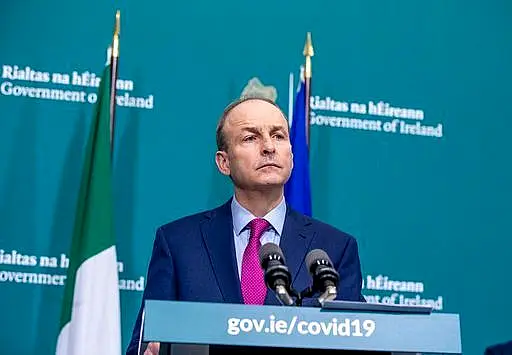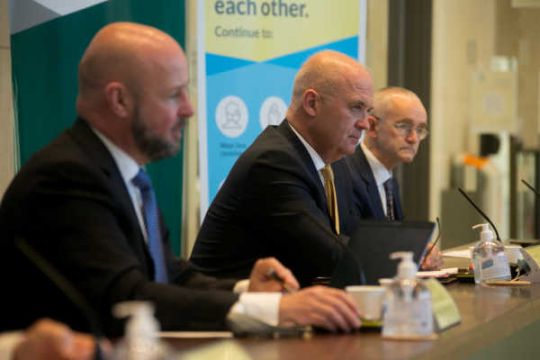While leaks and uncertainty around the Covid-19 pandemic are bad for people's mental health, a professor of psychiatry has said the tendency to blame public health officials and politicians comes because blaming the virus itself is "emotionally unsatisfactory".
Leaks of National Public Health Emergency Team (Nphet) advice to Government have been a consistent theme of the pandemic, leading to much anger and frustration among the public.
When the most recent restrictions were announced, the recommendation of a 5pm hospitality closing time was known for nearly a full 24 hours before the Government announced pubs and restaurants would be required to close at 8pm until at least January 30th.
Brendan Kelly, a Professor of Psychiatry at Trinity College Dublin, has studied the impact of the Covid-19 pandemic and restrictions on mental health in Ireland.
Speaking to BreakingNews.ie, Prof Kelly said leaks of this kind are inevitable. While they can have a negative effect, as we saw last week, he said they also prove that Nphet's advice to the Government is not always fully implemented.
Leaks
"The first thing is privacy is very difficult to maintain in a group like that, Nphet has more than 30 members. Any group with such large numbers means it’s difficult to maintain complete privacy and confidentiality.
“The other point to make is we live in a democracy so there needs to be a certain amount of transparency in the decision-making consistent with that," he said.
"There’s a lot of attention devoted to the relationship between Nphet and the Government and through it all it has become apparent that Nphet gives independent advice, I don’t think anybody holds the view that Nphet sugar coats its message for anybody.
"The media quite rightly highlights any difference between Nphet recommendations and Government decisions, but it’s right that there would be differences and different views between Nphet and the Government, that’s what the structure is for."
So what is the effect of this on public mental wellbeing?
"In one way it is reassuring to see the process unfolding clearly, to see the Nphet advice and Government decision and see how they are similar and different, I think that’s good. It would be helpful if the process were managed maybe a little more smoothly because the stakes are very high," Prof Kelly said.
"For a restaurant or pub owner the difference between 5pm closing and 8pm is hugely significant, so to live on that emotional roller-coaster for the day is difficult.
"I think it would be helpful if there was greater clarity in that what Nphet recommends is not necessarily what Government does, so that people who are trying to run businesses and keep people employed don’t live on such an emotional knife edge. That said, the process can only be sealed to a certain degree in a democracy.
"The uncertainty has a negative effect, often on specific members of the public, such as people who own or work in the hospitality venues. They had a very difficult day, and they’re now having a very difficult Christmas."
Prof Kelly said communications could be tailored to point out what the benefits of the restrictions can be, as seeing the bigger picture can help people come to terms with the impact on their daily lives.
"On the process, the big picture is that the restrictions are necessary to try to control or delay the new variant. In England, we’re continually hearing about the high numbers in London, but they don’t have the same restrictions.
"I would like to see a much stronger message that the public health measures and restrictions are working, that they are dampening the wave, and I think that would help to shift focus a bit from the process of government decision-making to the content of government decision-making, because we are in a better position than England to control this wave given the existing restrictions which have now been tightened again."
He added: "The fact is inequality is what really distresses people and some people are paying a higher price now than others, people who work in the hospitality sector and the entertainment sector are particularly affected. That inequality will be difficult."
Prof Kelly explained that the loss of employment, whether temporary or permanent, can have a lasting impact on mental health.
"The other thing that’s really difficult is loss of employment reduces wellbeing and happiness, regaining employment increases it again but not to what it was.
"Most people realise nobody can predict the next waves or how long they will last or how long this wave will be, but maybe making that explicitly clearer might be good rather than people simply reaching this conclusion owing to a series of leaks which might or might not turn out to be true.
"It’s helpful to explain clearly the benefits of the restrictions and also to repeatedly explain the nature of the information, as in, ‘this is a recommendation from Nphet for Government yet to consider’.
"That’s a fairly useful thing to do because it will make it clear to what extent Government is adhering to Nphet advice and how it’s choosing to implement it and to what degree. Greater clarity about the nature of the information and where it’s coming from and then clarity about the benefits of restrictions; hospital admissions averted, deaths that have not occurred."
At the beginning of the pandemic when the Fine Gael caretaker Government and Nphet handled the response, there was more solidarity between decision-makers and the public, while the relationship between the two bodies was also more in sync.
As the pandemic has lingered on, tensions both between the Government and Nphet, and the public's frustration, have grown.
Prof Kelly feels this is largely down to pandemic fatigue, rather than the restrictions themselves.

"It doesn’t always have to be painted as a difference of opinion between Nphet and the Government because there’s also a time factor, so it’s perfectly reasonable for the Government to note the Nphet advice and implement some but not all of it or tweak it slightly and give a very clear review date.
"Nphet do a very difficult job, their job is to advise Government and when you’re doing this, particularly in this high pressure environment, there is a lot of unspoken pressure from Government, from the public, from business owners, from whatever group can speak loudest.
"Nphet has retained an independence of thought that is admirable, we have seen over the past two years that they don’t hesitate to give advice to Government that the Government does not want to hear."
Prof Kelly feels some of the criticism of Nphet is unfair. Again, he feels a lot of it is rooted in the fact that it is "emotionally unsatisfactory" to blame a virus.
"It is unfair to blame Nphet in this way, Nphet has an awareness of health broadly, not just the virus, but the effect of restrictions on mental health for example, it's not like they are unaware of this, Nphet is filled with very accomplished policymakers and health professionals. I have no doubt there is a deep awareness not only of the negative effect of the virus but the negative effect of restrictions as well.
"It is psychologically unsatisfactory to blame a virus, so we do tend to blame people, we blame politicians or Nphet, we blame people we see walking around without masks. It is emotionally unsatisfactory to blame a virus, so we do tend to seek humans, and we disproportionately blame them."
We want people to blame, it’s a human instinct. There will never be a person to blame for this pandemic, it’s a misfortune that befell the world and has befallen our generation.
Prof Kelly explained that studies of the psychological impact of the pandemic show "one person in five in the general population has depression, anxiety or depressive systems which exceed their usual coping mechanisms".
"In certain groups it’s higher, in healthcare workers around two people in five have stress greater than they can cope with using their usual coping mechanisms," he said.
"This is down to a combination of the pandemic itself and the restrictions, it is very difficult to separate the two in terms of how people’s mental health is affected, so we need to bear in mind that restrictions reduce the incidences of Covid and having Covid has a very negative effect on mental health. We know it does with long Covid, six months after being infected with the virus around 30 per cent of people have significant depression or anxiety following the infection."
While some would presume this figure would vary from country to country, Prof Kelly said studies have shown it is similar right across the world, regardless of the different degrees of Covid restrictions.
"That one in five figure is absolutely consistent across the world, it’s extraordinarily consistent regardless of levels of restrictions, so you find the one in five number, 20 per cent of the general population with significant anxiety or depressive symptoms, you find that everywhere you look it’s one person in five regardless of level of restrictions.
"We talk a great deal about the negative mental health effects of restrictions but not so much the mental health impact of the pandemic and Covid itself, again this reflects the tendency that want to blame people rather than the virus. All the evidence suggests the bulk of the negative effects come from the fact of the pandemic not the restrictions.
"We want people to blame, it’s a human instinct. There will never be a person to blame for this pandemic, it’s a misfortune that befell the world and has befallen our generation."
While restrictions are hard to separate from the virus itself, Prof Kelly pointed out that Irish people are showing huge resilience in coping with both.
"The virus and the fact of a pandemic has led to most of this distress, obviously restrictions make a big contribution as well. It’s complex, but most of the psychological difficulty is caused by the virus and the pandemic rather than the restrictions."







